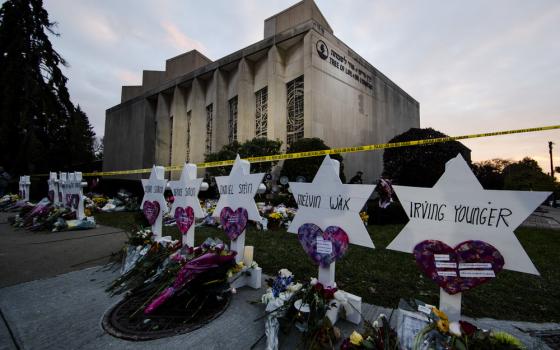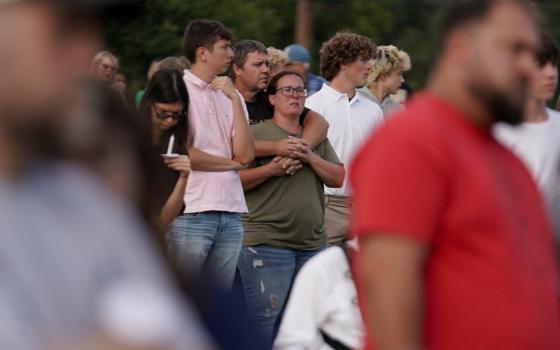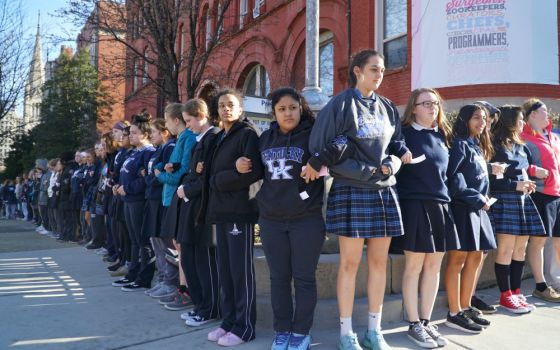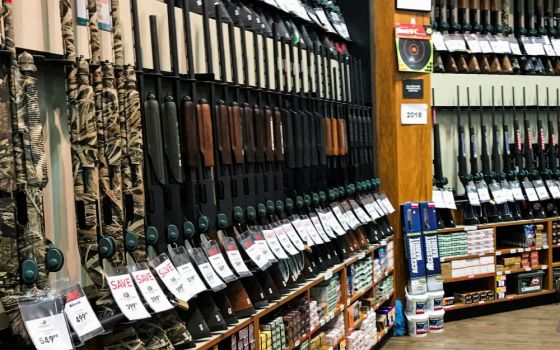In January, on the one-month anniversary of the mass shootings at Sandy Hook Elementary School and just ahead of the annual March for Life in Washington, D.C., we advocated on this page for weaving strong gun control legislation into the list of life issues demanding our attention. We specially called for strict legislation banning assault weapons and military-style magazines.
"It is imperative that we not allow the deaths of 27 people in Newtown, Conn., to slip from memory before something is done. Action is long overdue," we wrote then.
And we were not alone. New York Cardinal Timothy Dolan, president of the U.S. Conference of Catholic Bishops, said that "regulating and controlling guns is part of building a Culture of Life."
In mid-January, 14 Catholics -- including Stockton, Calif., Bishop Stephen Blaire, chairman of the U.S. bishops' Committee on Domestic Justice and Human Development; Daughter of Charity Sr. Carol Keehan of the Catholic Health Association; Kevin Lofton of Catholic Health Initiatives; and the presidents of the men's and women's religious leadership conferences -- joined 40 leaders of other faith groups to promote the initiative "Faiths United to Prevent Gun Violence." Among this group's proposals was mandating that every person buying a gun pass a criminal background check.
Days before the March for Life, 64 Catholic priests, nuns, scholars and two former ambassadors to the Vatican issued a letter saying that if marchers and politicians truly wanted to defend life they should support "common-sense reforms to address the epidemic of gun violence in our nation."
This latter group called particularly on Catholic lawmakers -- Republicans and Democrats alike -- who have "A" ratings from the National Rifle Association to stand up to the gun lobby.
"I share a deep commitment to protecting the sanctity of life in the womb," said one of the 64, Thomas Melady, a Republican who served as ambassador to the Holy See under the first President George Bush. "But what about our children, teachers and neighbors lost to the epidemic of gun violence? These innocent victims can no longer speak. Those of us proud to call ourselves pro-life must raise our voices on their behalf and demand that powerful lobbying groups stop standing in the way of sensible gun control measures that can save lives."
Writing in the Hartford Courant newspaper, Melady challenged politicians of both parties to "drop the false choices. We can honor the Second Amendment and also take reasonable steps to make our communities safer. ... Although a single law or set of regulations can't prevent every tragedy, there is no excuse for not taking action. The moral case is clear. The question is can our elected officials summon the political courage to defy the gun lobby and protect our communities?"
Now we know, six months after the Sandy Hook tragedy, that the answer to Melady's question is "No." The politicians did not have the courage to stand against the gun lobby. The public consensus and momentum for change that was forged in the wake of Sandy Hook has been squandered, and that makes it a deeper, grimmer tragedy.
Between the shootings of President Ronald Reagan and his press secretary James Brady, and the passage of the first federal law mandating background checks for gun buyers, 12 long years of intense bipartisan lobbying passed. Sensible gun control is possible. We must keep the wheels of justice grinding, however slowly.



